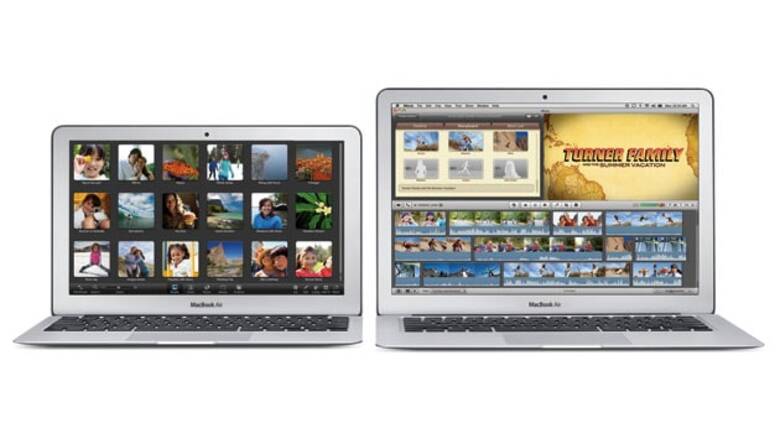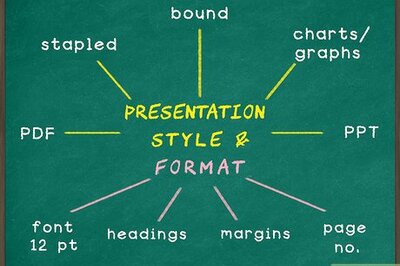
views
New York: The first MacBook Air laptop hit the catwalk in 2008 as an elegant but somewhat impractical statement about how far Apple would go to make the thinnest laptop ever. It wasn't very powerful, had a short battery life and started with a nosebleed price tag of $ 1,800.
Apple has revamped the Air and introduced two models last week. Suddenly, the Air is one of the cheapest ways to get into the Mac line, starting at $ 999, the same price as the entry-level, plastic MacBook.
That's quite welcome, as are some improvements under the hood. The cheapest Air has a screen that runs 11.6 inches diagonally - smaller than any other MacBook. The larger model, starting at $ 1,299, has a 13.3-inch screen, the same size as the old Air. Either one is thin enough to scalp someone if thrown as a Frisbee, and the aluminum shell is as eye-catching as before.
But the Air models still represent a victory of style over function, and they arrive to face competition from a device the first Air wasn't compared to: Apple's own iPad tablet computer.
When showing off the iPad for the first time in January, Apple Inc. CEO Steve Jobs talked about how the industry has tried to come up with good device to fill the size gap between the laptop and the smart phone. He attacked the "netbooks" - small, cheap laptops - that had a flash of popularity in the space.
"The problem is, netbooks aren't better at anything," Jobs said.
He might as well have been talking about the Airs. The only advantage they have over a regular MacBook is portability, and they give up a lot of power. Meanwhile, the iPad is cheaper, lighter, and above all, more fun. Things you can't do on an iPad, such as photo and video editing, the Airs don't do as well as a MacBook.
The Airs have slower processors, and the storage drives are meager. They have no DVD drives, no backlit keys and they lack the MacBook's nifty external indicator showing you how much battery you have left. In exchange, the 13.3-inch model is a pound and a half lighter than a full-figured MacBook Pro. The 11.6-incher shaves off another half a pound.
That said, even the 11.6-inch Air is a lot more than a netbook in a sharp suit. It should be, with a starting price three times higher than a typical netbook. The processor is a lot faster than a netbook's, which means, for one thing, that it can play Flash video without problems. It can even handle taxing work such as video editing, as long as you stay away from really high-resolution footage.
I was even able to run the graphically taxing game Dragon Age: Origins enjoyably on the 13.3-inch model. However, that caused the internal cooling fan to spin up mightily, making an otherwise quiet computer sound like it was about to take flight.
On the old Air, an external storage drive made of flash memory chips was available as an expensive upgrade. On the new ones, it's standard. That's one reason the Airs can be so slim. But the flash drives also improve performance: applications pop open faster than they do on a MacBook Pro.
The downside is that the drives are small, which will frustrate people who want to keep a lot of video, music and games on their machines. The 11.6-inch model starts with 64 gigabytes, while the 13.3-inch has 128 gigabytes. The capacities can be doubled for an extra $ 200 or $ 300, respectively. By comparison, the $ 999 regular MacBook comes with a traditional 250 gigabyte hard drive.
Some of the space saved by the move to solid-state drives was filled by an expanded battery. That gives the 11.6-inch model a practical Web-surfing time of five hours. The 13.3-inch model lasts two hours longer. Neither figure is great compared with some "ultrathin" Windows-based laptops, and many netbooks do better.
Apple is employing some tricks to extend the useful battery life. For instance, the Air now uses less power when "on" but closed. I was able to leave it overnight with no loss of battery charge - pretty impressive.
The aluminum skeleton and skin is appealing and lends a nice rigid feeling to the body, but in my experience with other Macs, it doesn't stay pretty for long, unless you're very careful. The matte metal surface scuffs and dents in a way plastic does not.
Overall, the new Airs are excellent as Web surfing and writing platforms, and the lower price means they deserve a closer look than the old model. For a student or a frequent traveller, they might be just the ticket. Many will find, though, that an iPad with an accessory keyboard does the same job, if coupled with a more powerful MacBook for the heavy lifting.



















Comments
0 comment